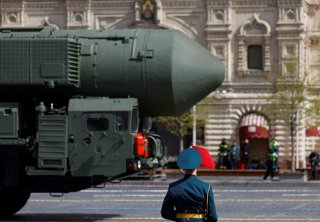Why Hasn’t Putin Gone Nuclear in Ukraine?
So far, the deterrent value of Russia’s nuclear arsenal remains greater than its possible benefit on the battlefield.
So far, the deterrent value of Russia’s nuclear arsenal remains greater than its possible benefit on the battlefield. As a deterrent, these warnings have already succeeded in limiting the type of aid NATO members have provided Ukraine, while the threat of escalation has increased demands that Ukraine cede significant territory in a final peace deal. This represents a major success for Putin.
Just as the United States realized during the Korean War, Putin understands that he can use conventional weapons in a manner that can approximate the same horror and destruction of nuclear weapons, such as by threatening to destroy the Kakhovka Dam, using massed, concentrated artillery fire against Ukrainian Army positions, or launching devastating missile and drone strikes against Ukraine’s infrastructure. However, Ukraine’s citizens have refused to be cowed by fears of either a Russian nuclear strike or continued conventional terror bombing; they understand the horrors awaiting them under Russian occupation. NATO must continue to provide Ukraine with the weaponry needed to negate Russia’s conventional terror attacks.
The Korean War demonstrates that nuclear weapons offered no panacea for American battlefield setbacks. Nor do they in the Russo-Ukraine war, where Putin’s strategic failures have ruined Russia’s military and left the Kremlin a global pariah on the verge of a terrible defeat. Indeed, nuclear use would vastly magnify Russia’s crisis by turning what few allies it has against it. Nevertheless, many remain fearful that Putin would still escalate if he believed it necessary to stay in power. It should be the goal of the international community to convince Putin that the greatest threat to his political survival would instead come from nuclear use.
Gregory Mitrovich is an award-winning historian whose forthcoming book is entitled The Contest: The United States, Great Britain, Germany, and the Rivalries that Forged the American Century.
Image: Reuters.

